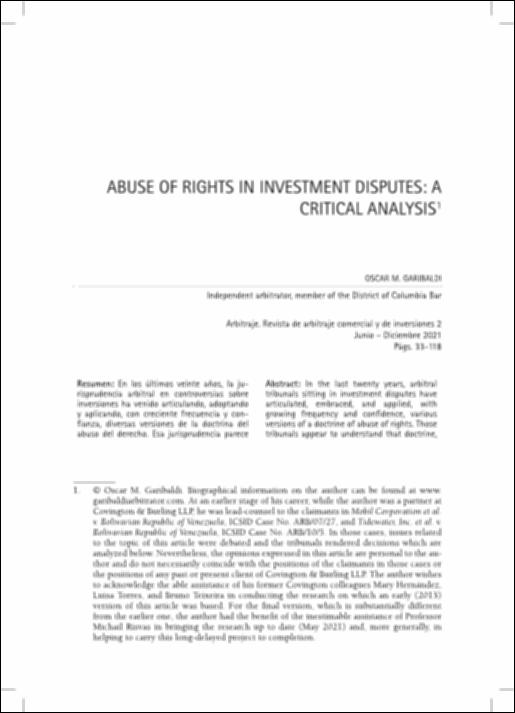Please use this identifier to cite or link to this item:
http://hdl.handle.net/10637/13832Abuse of process in investment arbitration.
| Title: | Abuse of process in investment arbitration. |
| Authors : | Seara Cardoso, Francisca Jankowski, Adam |
| Keywords: | Abuso del derecho; Arbitraje de inversiones; Buena fe; Reestructuración de inversiones; Phoenix, Mobil v. Venezuela; Pac Rim Tidewater; Philip Morris v. Australia; Abuse of rights; Abuse of process; Investment arbitration; Good faith; Investment restructuring |
| Abstract: | En los últimos veinte años, la jurisprudencia arbitral en controversias sobre
inversiones ha venido articulando, adoptando
y aplicando, con creciente frecuencia y confianza, diversas versiones de la doctrina del
abuso del derecho. Esa jurisprudencia parece entender esta doctrina, así como la subdoctrina del abuso del proceso, como la aplicación
a controversias relativas a inversiones de una
doctrina general de interdicción del abuso del
derecho, la cual es aceptada expresa o tácitamente como parte del Derecho internacional
general. Este artículo tiene por fin examinar
críticamente los presupuestos conceptuales y
jurídicos sobre los que descansan esas decisiones y la medida en que guardan coherencia
con los principios y la lógica de la doctrina que
pretenden acoger y aplicar. Para ello, el artículo
analiza las principales cuestiones (conceptuales, metodológicas, político-ideológicas) que
subyacen la doctrina del abuso del derecho; la
controvertida cuestión de si dicha doctrina ha
pasado a formar parte del Derecho internacional; la progresiva aceptación de la doctrina en
la jurisprudencia en materia de inversiones; y,
en fin, los tres principales problemas que plantea la forma en que la doctrina viene aplicándose: su estatus jurídico, los derechos a que se
aplica y el criterio para calificar un ejercicio de
un derecho como abusivo. El artículo concluye
con breves observaciones sobre tres temas más
generales: las razones de la aceptación, generalmente acrítica, de la doctrina del abuso de
derecho en la jurisprudencia sobre inversiones;
la transformación de la doctrina, en su origen
una institución típica del Derecho civil continental basada en un criterio general de abuso,
en una norma de características similares a las
del «common law», aplicada sobre la base de
similitudes de hecho con casos anteriores; y
la incertidumbre que suscita la potencial aplicación plena de la doctrina a los derechos de
los Estados. In the last twenty years, arbitral tribunals sitting in investment disputes have articulated, embraced, and applied, with growing frequency and confidence, various versions of a doctrine of abuse of rights. Those tribunals appear to understand that doctrine, and the sub-doctrine of abuse of process, as the application to investment disputes of a general doctrine of abuse of rights, which those tribunals explicitly or implicitly accept as part of general international law. The purpose of this article is to examine, from a critical perspective, the conceptual and legal assumptions on which those arbitral decisions are based and the extent to which they are consistent with the tenets and logic of the doctrine they purport to embrace and apply. To this end, the article discusses the main issues (conceptual, methodological, politico-ideological) that lie at the basis of the doctrine of abuse of rights; the vexed question whether that doctrine has become a part of international law; the gradual acceptance of the doctrine in investment jurisprudence; and the three main problems arising from the way the doctrine is being applied: the legal status of the doctrine, the rights to which it applies, and the criterion of abuse. The article concludes with brief observations on three more general topics: the reasons for the generally uncritical acceptance of the doctrine of abuse of rights in investment disputes; its transformation from a quintessential civil-law doctrine based on a general criterion of abuse into a common-law-type rule applied on the basis of similarities of fact patterns; and the uncertainties that arise from the potential full application of the doctrine to the rights of states. |
| Description: | En: Arbitraje: revista de arbitraje comercial y de inversiones. eISSN. 2603-9281. vol. 13, n. 2, 2021, pp 187-214 |
| URI: | http://hdl.handle.net/10637/13832 |
| Rights : | http://creativecommons.org/licenses/by-nc-nd/4.0/deed.es |
| Issue Date: | 1-Dec-2021 |
| Appears in Collections: | 2021 Arbitraje nº 2 |
Items in DSpace are protected by copyright, with all rights reserved, unless otherwise indicated.


